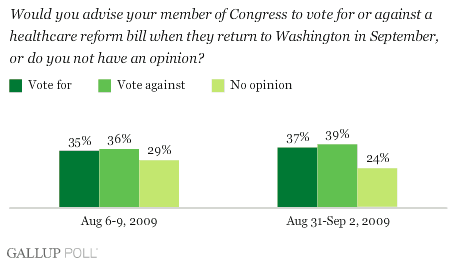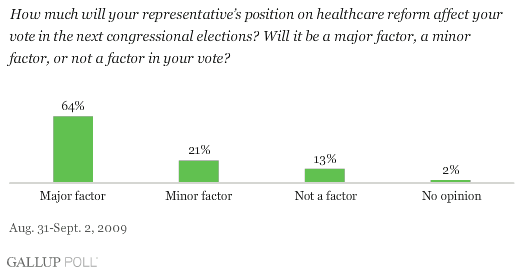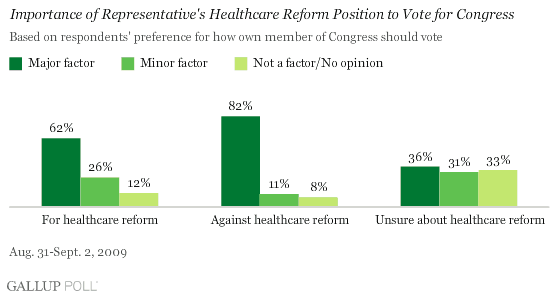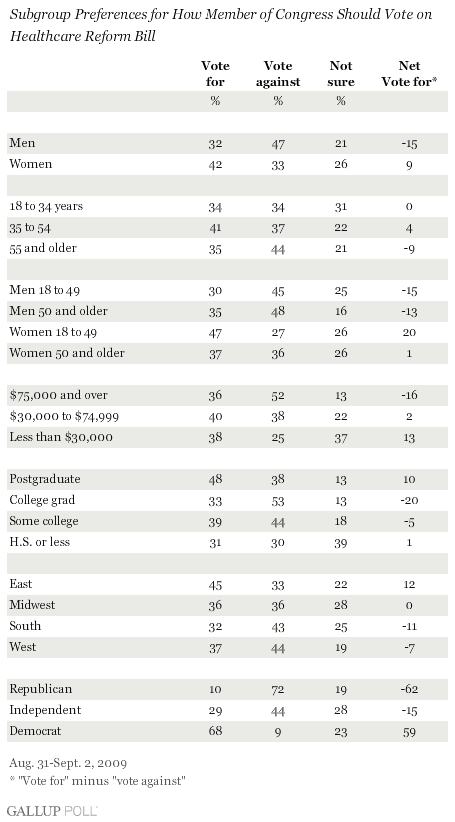PRINCETON, NJ -- The American people are no less divided on healthcare reform today than they were a month ago. A new ���۴�ýPoll finds 39% of Americans saying they would direct their member of Congress to vote against a healthcare reform bill this fall while 37% want their member to vote in favor.

One in four Americans (24%) say they have no opinion about which way their representative should vote on a healthcare reform bill, down only slightly from early August.
The new ���۴�ýPoll, conducted Aug. 31-Sept. 2, suggests the issue could be politically potent in 2010. Sixty-four percent of Americans say their representative's position on healthcare reform will be a major factor in their vote in the next congressional election; just over a third say it will be no more than a minor factor.

Opponents of reform have the edge in intensity here. Among Americans who want their member of Congress to vote against healthcare reform, 82% say the issue will be a major factor in their vote in next year's elections. Among those wanting their member to vote for reform, 62% say the issue will be a major factor for them.

Demographic Breaks on Support for Healthcare Reform
Public attitudes about how members of Congress should vote on healthcare reform are highly partisan. Two-thirds of Democrats (68%) want their representative to support a healthcare reform bill while a comparably sized majority of Republicans (72%) want their member to vote against it. Independents lean against healthcare reform, 44% vs. 29%, although their opposition does not rise to the level of a majority (28% of independents offer no opinion).
Apart from Democrats, support for healthcare reform is highest among women, lower-income Americans, those with postgraduate education, and residents of the East.
Looking at support by gender and age, women under 50 are particularly supportive (47% in favor of passage vs. 27% against), whereas women 50 and older are about evenly split.
A slight majority of upper-income Americans want their representative to vote against healthcare reform. Middle-income Americans are divided on the question while lower-income Americans are more supportive than opposed.
Young and middle-aged Americans are closely divided in their views, while adults 55 and older lean against reform. These generational findings are consistent with other ���۴�ýpolling in recent months finding seniors to be .

Bottom Line
A month of town-hall meetings across the country during Congress' August recess has hardly budged Americans' views about passing a healthcare reform bill, or helped many more Americans form an opinion. The public is as divided over healthcare reform today as at the beginning of August (37% in favor and 39% opposed), with a large segment still undecided.
Although the two sides on healthcare reform are about evenly matched numerically, opponents may have a political edge. The 82% of reform opponents saying the issue will be a major factor in their vote for Congress next year eclipses the 62% of reform advocates who say the same.
Survey Methods
Results are based on telephone interviews with 1,026 national adults, aged 18 and older, conducted Aug. 31-Sept. 2, 2009. For results based on the total sample of national adults, one can say with 95% confidence that the maximum margin of sampling error is ±4 percentage points.
Interviews are conducted with respondents on land-line telephones (for respondents with a land-line telephone) and cellular phones (for respondents who are cell-phone only).
In addition to sampling error, question wording and practical difficulties in conducting surveys
